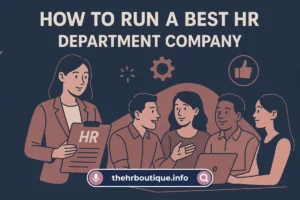Let me tell you a story about my friend Sarah. She runs a growing marketing agency with about 30 employees. Last year, she spent more time dealing with payroll errors and employee complaints than she did on client work. Sound familiar? That’s when she made the switch to outsourced HR – and it completely transformed her business.
But here’s the truth: outsourcing HR isn’t magic. I’ve seen it work wonders for some businesses and backfire spectacularly for others. After helping dozens of companies navigate this decision, I want to give you the straight talk – no fluff, no sales pitch – about whether outsourcing HR could be right for your business.
What Exactly Are We Talking About Here?
When I say “outsourcing HR,” I’m referring to handing over some or all of your human resources functions to an external provider. These firms specialize in handling the HR tasks that keep you up at night:
- The never-ending payroll cycle.
- Benefits administration headaches.
- Compliance with constantly changing employment laws.
- Recruitment and onboarding processes.
- Employee relations issues.
Some companies go all-in, outsourcing everything. Others pick specific pain points to address. There’s no one-size-fits-all approach – just what works for your unique situation.
Benefits of Outsourcing HR Functions
1. The Money Factor (It’s Better Than You Think)
Let’s cut to the chase: HR is expensive to do in-house. A competent HR manager will cost you at least $60,000 annually in salary alone. Add benefits, training, and HR software subscriptions, and you’re looking at $80,000+ per year.
Now consider this: Most outsourced HR providers charge between $50-$150 per employee per month. For Sarah’s 30-person agency? That’s $1,500-$4,500 monthly – a fraction of what an in-house hire would cost.
But the real savings come from:
- Avoiding costly compliance mistakes (we’re talking thousands in fines).
- Reducing time spent on administrative tasks (what’s your time worth?).
- Eliminating the need for expensive HR software licenses.
2. Sleep Better at Night With Compliance Handled
Remember the overtime rule changes a few years back? I had a client who nearly went under because they didn’t update their policies in time. Their competitor? They were using an HR provider who handled everything automatically.
This is where outsourcing shines. Good providers:
- Track changing labor laws in real-time (FMLA, ADA, local sick leave laws).
- Handle all payroll tax filings and documentation.
- Maintain proper employee classification (1099 vs W-2).
- Document everything to protect you in case of audits or lawsuits.
3. Get Your Time Back (Finally)
Here’s an exercise: Track how many hours you and your managers spend each week on:
- Fixing payroll mistakes.
- Answering benefits questions.
- Processing new hires.
- Dealing with employee complaints.
For most small business owners, it’s 10-20 hours weekly. That’s time you could spend growing your business, serving customers, or (gasp) actually taking a weekend off.
4. Access Tools You Couldn’t Afford Otherwise
Modern HR runs on technology – but good HRIS platforms like BambooHR or Paycor can cost thousands annually before you even factor in implementation.
Most outsourced providers include:
- Automated payroll systems.
- Employee self-service portals.
- Time tracking and scheduling tools.
- Benefits enrollment platforms.
All without the hefty price tag or learning curve.
Disadvantages of HR Outsourcing
Now, I’d be doing you a disservice if I didn’t share the potential pitfalls I’ve seen firsthand.
1. The “Faceless HR” Problem
Jen in accounting loved being able to pop down to HR to discuss her maternity leave. Now she has to call an 800 number and explain her situation to a stranger. See the issue?
Employees often resist the impersonal nature of outsourced HR. The fix? Look for providers offering:
- Dedicated account managers.
- On-site visits (for larger companies).
- Options to keep some HR functions in-house.
2. You’re Giving Up Control
When you outsource, you’re trusting critical decisions to outsiders. I’ve seen cases where:
- A provider’s slow response escalated an employee conflict.
- Generic policies didn’t fit the company culture.
- Hiring processes felt disconnected from business needs.
The solution? Clear service level agreements and maintaining oversight of key decisions.
3. Watch Out for Bait-and-Switch Pricing
Some providers lure you with low base rates, then hit you with:
- $200/hour “consulting” fees for basic questions.
- Per-employee price jumps at certain thresholds.
- Expensive termination clauses.
Always get full pricing in writing before signing.
4. Security Matters More Than You Think
HR data includes Social Security numbers, bank accounts, and medical information. A breach could be catastrophic. Only work with providers who can demonstrate:
- SOC 2 Type II certification.
- Encryption for all sensitive data.
- Clear breach response protocols.
Making the Right Choice for Your Business
So how do you know if outsourcing makes sense? Ask yourself:
- Is HR administration consuming too much of your time?
- Do you lay awake worrying about compliance risks?
- Are HR costs eating into your profitability?
- Is your current HR support struggling to keep up with growth?
If you answered yes to several of these, it’s worth exploring further.
Final Thoughts
After seeing hundreds of businesses navigate this decision, here’s my honest take: Outsourcing HR can be transformative when done right, but disastrous when done poorly.
The companies that succeed:
- Choose providers carefully (don’t just go with the cheapest).
- Maintain some internal HR presence for culture.
- Set clear expectations from day one.
- Regularly review the relationship.
Sarah’s agency? They saved $50,000 in the first year while actually improving employee satisfaction scores. But I’ve also seen companies rush into bad contracts they later regretted.
The bottom line? If HR headaches are holding your business back, outsourcing could be your solution – but only if you approach it strategically.
What’s been your experience with HR outsourcing? I’d love to hear what’s worked (or hasn’t) for your business. Drop me a comment below with your thoughts.





